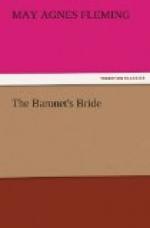It was worse in the drawing-room, with the lights and the music, and his stately wife at the piano, and Lady Helen at his side, prattling with little Mildred over a pile of engravings. All the time, in a half-distracted sort of way, his thoughts were wandering to the sexton’s cottage and the woman dying therein—the woman he had thought dead years ago—dying there in desolation and misery—and here the hours seemed strung on roses.
It was all over at last. The guests were gone, the baby baronet slept in his crib, and Lady Kingsland had gone to her chamber. But Sir Jasper lingered still—wandering up and down the long drawing-room like a restless ghost.
A clock on the mantel chimed twelve. Ere its last chime had sounded a sleepy valet stood in the doorway.
“A messenger for you, Sir Jasper—sent by the Reverend Mr. Green. Here—come in.”
Thus invoked, Mr. Dawson entered, pulling his forelock.
“Parson, he sent me, zur. She be a-doying, she be.”
He knew instantly who the man meant.
“And she wishes to see me?”
“She calls for you all the time, zur. She be a-doying uncommon hard. Parson bid me come and tell ’ee.”
“Very well, my man,” the baronet said. “That will do. I will go at once. Thomas, order my horse, and fetch my riding-cloak and gloves.”
The valet stared in astonishment, but went to obey. It was something altogether without precedent, this queer proceeding on the part of his master, and, taken in connection with that other odd event in church, looked remarkably suspicious.
The night was dark and starless, and the wind blew raw and bleak as the baronet dashed down the avenue and out into the high-road. He almost wondered at himself for complying with the dying woman’s desire, but some inward impulse beyond his control seemed driving him on.
He rode rapidly, and a quarter of an hour brought him to the sexton’s cottage. A feeble light glimmered from the window out into the blackness of the night. A moment later and he stood within, in the presence of the dying.
The Reverend Cyrus Green sat by the table, a Bible in his hand. Kneeling by the bedside, her face ghastly white, her burning black eyes dry and tearless, was the young woman. And like a dead woman already, stretched on the bed, lay Zenith.
But she was not dead. At the sound of the opening door, at the sound of his entrance, she opened her eyes, dulling fast in death, and fixed them on Sir Jasper.
“I knew you would come,” she said, in a husky whisper. “You dare not stay away! The spirit of the dying Zenith drove you here in spite of yourself. Come nearer—nearer! Sir Jasper Kingsland, don’t hover aloof. Once you could never be near enough. Ah, I was young and fair then! I’m old and ugly now. Come nearer, for I can not speak aloud, and listen. Do you know why I have sent for you?”




